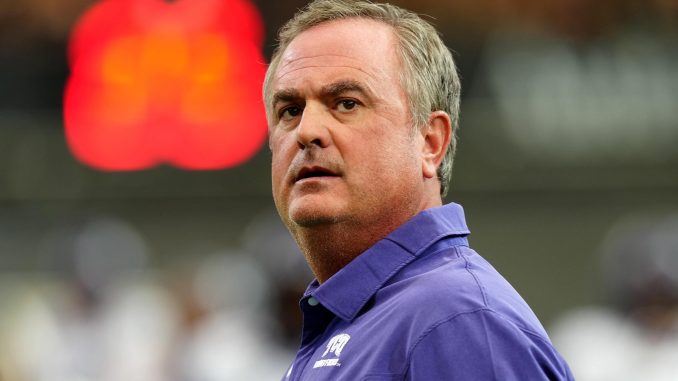
TCU Horned Frogs Football Head Coach Sonny Dykes Discusses Racism and Diversity Within the Program
In a recent interview, Texas Christian University (TCU) Horned Frogs football head coach Sonny Dykes addressed the ongoing conversation surrounding racism, diversity, and inclusion within college sports. Known for his progressive leadership and focus on building a strong, united team, Dykes’ comments shed light on the challenges and progress being made within TCU’s football program.
Acknowledging the Problem
Coach Sonny Dykes began by acknowledging that racism has been a long-standing issue in sports, including college football. He expressed a firm belief that the sport, like society at large, has made strides in addressing racial disparities, but there is still significant work to be done.
“Racism in football, like in any other area of society, is something we can’t ignore,” Dykes said. “It’s important that we have conversations about it and work to create an environment where all our players feel valued, respected, and supported, regardless of their background.”
Dykes emphasized that while TCU has made significant strides in terms of diversity, he recognizes the importance of continually addressing the issue, both within the program and in broader discussions surrounding college athletics. He pointed out that the coaching staff, the administration, and the players all play a role in creating an inclusive culture.
Diversity and Inclusion Efforts at TCU
Dykes spoke candidly about the initiatives that have been put in place at TCU to combat racial inequality and promote diversity within the football program. One of the most notable efforts has been the recruitment of diverse players, ensuring that the team reflects a variety of backgrounds and experiences.
“At TCU, we’re committed to building a team that mirrors the world we live in,” Dykes explained. “That means we’re actively looking to recruit players from diverse racial and cultural backgrounds. It’s not just about filling spots—it’s about ensuring our players can bring their full selves to the field.”
Furthermore, Dykes highlighted the importance of providing support systems for players who may face challenges off the field, especially those related to racism or discrimination. The team has implemented various programs, including mentorship initiatives and discussions on social justice issues, to ensure that players feel heard and supported in a safe and open environment.
A Safe Space for Dialogue
One of the most critical components of Dykes’ approach is fostering a culture where difficult conversations can take place. This includes discussing issues of racism not just among coaches and players but also with staff and faculty at TCU. Dykes revealed that the team has held open forums where players can voice concerns about racism or other forms of discrimination in a safe space.
“We’ve had some very real, very difficult conversations about racism and injustice. These discussions are hard, but they’re necessary,” Dykes explained. “It’s about creating an environment where our players can be honest with us and with each other. It’s about ensuring they know that they have a voice in these conversations.”
These conversations have led to increased awareness and understanding of the racial challenges faced by many of the players, some of whom come from communities where they may have encountered racism firsthand. Dykes noted that it’s important for the coaching staff to understand these lived experiences in order to support their players both as athletes and as individuals.
Empowering Players for Social Change
Beyond the football field, Dykes also believes that the TCU Horned Frogs have an opportunity to empower players to take a stand on social issues, including racism. He praised his players for their activism, particularly in the wake of events like the Black Lives Matter movement and the rise of conversations about racial inequality across the nation.
“Our players are leaders not just on the field but also in their communities,” Dykes said. “It’s important that they understand the power they have to make a difference, whether it’s through speaking out about injustice, supporting social causes, or simply leading by example.”
This empowering mindset has helped many TCU athletes engage in community service projects and activism aimed at promoting racial equality. Dykes noted that it’s crucial for athletes to leverage their platform to influence positive change, both within the sport and in society.
Looking Ahead
While Sonny Dykes has made significant strides in addressing racism within the TCU Horned Frogs football program, he stressed that this is an ongoing effort. He believes that addressing racism in college football is not just a matter of individual actions but requires systemic change across all levels of the sport.
“We have to keep pushing for change,” Dykes stated. “It’s about fostering an environment where racism is not tolerated, where diversity is celebrated, and where all players feel valued and respected. It’s a journey, not a destination.”
As TCU’s football program continues to evolve, Dykes remains committed to ensuring that the Horned Frogs not only perform at a high level on the field but also set a standard for how athletes and coaches can work together to make a meaningful impact on society. Through his leadership and dedication to creating an inclusive environment, Coach Sonny Dykes is showing that college football can be a platform for positive change, both in sports and in society at large.
In the end, Dykes’ approach to combating racism and fostering inclusion in college football serves as a reminder that change is not only possible—it is necessary.
Be the first to comment